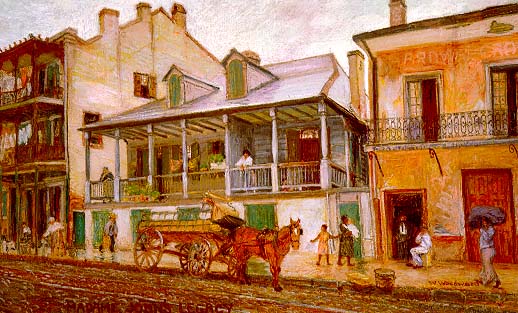| BEAUMONT AND HIS CREOLE SONGS |
Joe (Joseph) Beaumont was born
in New Orleans in 1820 and died in that city in 1872, having
spent his entire life there. His even temperament and kindly
attitude toward all his fellow men won for him in return their
highest esteem and love.
As a poet he was ingenious and natural.
He composed attractive verse and never failed to impart the
truth in his writings. One observes these qualities above
all in his Creole songs, which always reveal a depth of thought
and teach a moral based on life as it is. He was a Creole
poet of distinct merit.
Beaumont showed his special
talent as a Creole song writer on the occasion of a lawsuit
that took place in our city a short time before the Civil
War. The dispute resulted from a quarrel among some children
on the street. One of the children called another a Negro.
A fight ensued that created quite a disturbance, so the defense
claimed.
The person attacked, rightfully sought to justify her claim
that she was of the Caucasian race, that she was white, as
the expression was then used. The prosecution proved that
she was of African descent, and so she was recognized by the
state supreme court.
1. The Toucoutou Affair refers
to a well-known lawsuit that took place in New Orleans shortly
before the Civil War. It became the subject of Beaumont's
songs and, later, of Edward Larocque Tinker's novel Toucoutou
(New York: Dodd and Mead, 1928).
| OUR PEOPLE AND OUR HISTORY |
This Case attracted attention
because many people in doubt about their origin had been turning
to the law to establish a desirable identity. Persons who
proved their civil status in court passed as white and enjoyed
the rights and privileges accorded this standing. An adverse
decision on the other hand proved disastrous, fatal, because
it resulted in the loss of all prestige for the complainant,
who never again could live under the same social conditions.
These circumstances created division among our people. Some
approved, others disapproved the idea of wishing to pass into
white society. The dissidents were in the majority, and Beaumont,
although a quadroon, was in full sympathy with that group.
It was thus he became interested in this famous case for which
he acted as historian.
l
Unfortunatelyewe do not have all the poems that Beaumont
composed relative to this occasion, but we trust the following
extracts will suffice to prove his genius and to show how
our people reacted to the foolish controversy over the color
of the skin. The poet explains the beginning of the trouble
thus:
| My master flew like a teal |
Coming out of Bonfuca.
He came to bring the news;
To take his sister in his arms;
To say: "Dear Toucoutou,
I think we are going crazy."
The sister indignant answered:
What's all this talk about?
Here in my parlor?
Why do you speak thus to me?
Like an evil vagabond?
A white person! Ah, are you crazy?...
My name is not Toucoutou.
Then, the philosopher-brother
explains to his exasperated sister that some people of color
who were trying to pass them-selves off as white were exposed
to the contempt of their neighbors. The poet says this:
Oh well, dear Anastasia,
When the Negro tries to be white,
Society will finish him,
You better hide under a tin plate.
On another occasion during
the prosecution, Anastasia, believing she saw advantages on
her side, put on an air of disdain. She threatened her frightened
adversary as indicated in the lines:
She looked at poor Eglantine,
Who was almost dying of strain,
And said to her: "My stubborn one,
You will really know me tomorrow."
Anastasia lost the case. Her
brother came to tell her the bad news, saying that he had
been present and had heard the judgment of the court from
the very mouth of the judges:
I visited the Court Supreme,
To see what they were doing,
I heard the judges and the lawyers say
That we have lost the suing.
But the most popular song Beaumont
composed at the time of the trial of Toucoutou is the one
in which he interprets the spirit of the people. In this remarkable
composition, Beaumont uses all the irony of his joking nature.
After showing how the Negroes would be unhappy if Anastasia
had succeeded, he tells of the prestige and social advantages
she has lost and ends by hoping that the lesson would serve
as an example. Here are the couplets just as they have come
down to us:
If you win your lawsuit
Indeed, O Negress, this is bad;
Bad for those who force it
And the harm cannot be disregarded.
OUR PEOPLE AND OUR HISTORY
Refrain: Ah, Toucoutou, we
know you!
You are a little Mooress.
Who does not know you?
No soap will make you white.
At the theater, if you go there,
Like all white people should,
They will treat you like Jacdeloge,
Who did not pass so well as white, did he?
Refrain: Ah, Toucoutou….
When these white lawyers give a dance
Will you be able to go?
Will you, O beautiful devil,
You who love to dance so!
Refrain: Ah, Toucoutou…
I have finished my little song
Because I want to sleep;
But I think the lesson will serve,
For a long time to keep you meek.
Refrain: Ah, Toucoutou….
The lesson did not serve the
purpose the poet thought it would.
One can say that Beaumont was the Beranger of the Creole people.
|

